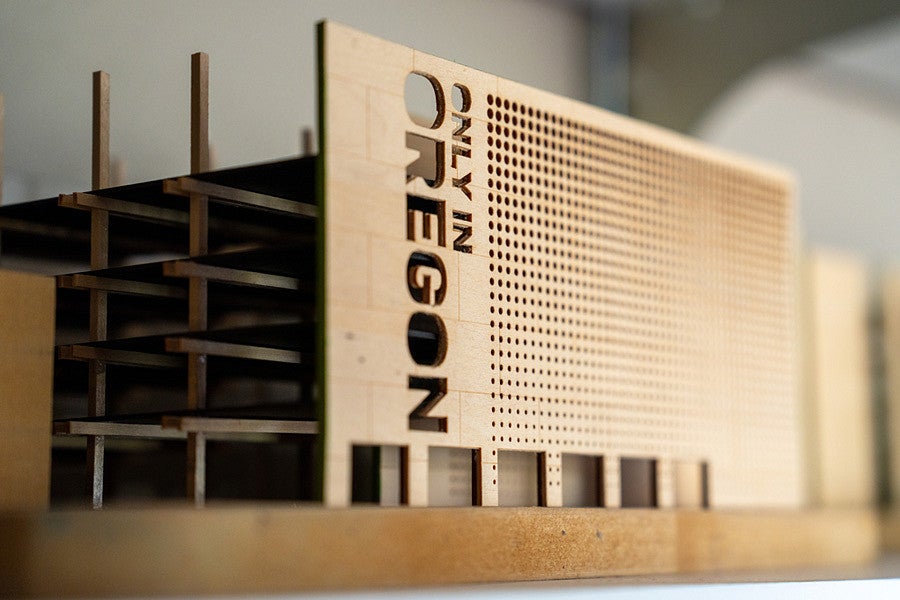
The College of Design is celebrating the awarding of the tech hub designation to the Pacific Northwest (PNW) Mass Timber Tech Hub by the Biden-Harris administration on Monday, October 23. The PNW Mass Timber Tech Hub (Tech Hub) is led by Oregon State University and features strategic partnerships with multiple PNW organizations and institutions, including involvement from College of Design researchers and faculty. The Tech Hub is aiming to become a mass timber design and manufacturer global leader. Utilizing the region's wood products, the research, development expertise, and partnerships with architectural, engineering, and construction firms, the Tech Hub will help lower the construction industry’s carbon footprint and increase housing affordability by investing in advanced material science in order to position mass timber as a viable and sustainable construction alternative.
The Tech Hub joins 30 other like-minded organizations that were announced by the U.S. Department of Commerce’s Economic Development Administration's (EDA) announcement early Monday. These tech hubs are located across 32 state and Puerto Rico representing a diverse cross-section of rural and urban regions. Designation by the EDA is an endorsement and reinforcement of the hard work and research being completed by the college and its partners, as the specialized designation also carries an opportunity to apply for implementation funding of $50–$70 million.
The announcement and designation of these tech hubs is a first phase for the new Tech Hubs program. This economic development initiative is designed to drive regional development through the strengthening of the community's capacity to manufacture, commercialize, and deploy technology to increase the country's competitiveness on the national stage. The program invests directly with the aim of transforming regions into globally competitive innovation centers and the PNW Mass Timber Tech Hub is positioned to deliver on the promise of the region thanks to the development and research of Mass Timber.
“Innovation, cutting-edge research, and creativity can be found in every community across America. Thanks to President Biden’s Investing in America Agenda, the Tech Hubs program is seizing that potential and investing in regional consortia that will boost U.S. manufacturing, create more good-paying jobs and bolster U.S. global competitiveness,” said Deputy Secretary of Commerce Don Graves. “The phase 1 designees and grant recipients reflect the diverse technological industries growing here at home and are symbols of American innovation and opportunity. The Tech Hubs program will provide them tools and resources to drive economic growth across the nation, which Americans will feel for generations to come.”
The PNW has a multitude of different economic, social, and environmental challenges that have been felt disproportionately by historically marginalized communities. From housing shortages to droughts and wildfires to forestry employment opportunities disappearing, the development and research of mass timber could be a gamechanger for everyone.
“Mass timber offers a means to holistically address all these challenges,” said Judith Sheine, professor of architecture at the University of Oregon and principal investigator of the NSF Regional Engine for Advancing mass timber technologies (OR, WA). “The built environment is responsible for 47% of U.S. carbon dioxide emissions, with building materials and construction accounting for 20%. At the same time, mass timber buildings can help to improve forest health and reduce catastrophic wildfires, by using wood fiber from forest restoration projects. Mass timber can also offer a pathway to address the critical shortage of affordable housing on the West Coast, with cost-efficient prefabrication.”
Mass Timber includes engineered construction materials made from small pieces of wood that can be sourced from selectively harvested logs. It is a sustainable alternative to concrete and steel, and its use in buildings can reduce the carbon footprint of the U.S. building industry. While the EDA's announcement doesn't specifically come with any additional funding, the designation and ability to apply for future implementation funding is a huge boon to the region and will help fortify the PNW's position as a hub of innovation in the field of mass timber.
Read more about the EDA designation: https://www.eda.gov/news/press-release/2023/10/23/biden-harris-administration-designates-31-tech-hubs-across-america
Read more about TallWood Design Institute and UO's partnership: https://uonews.uoregon.edu/university-oregon-spearhead-innovations-mass-timber
Read more about the mass timber system: https://research.uoregon.edu/about/announcements/building-pnw-mass-timber-ecosystem
